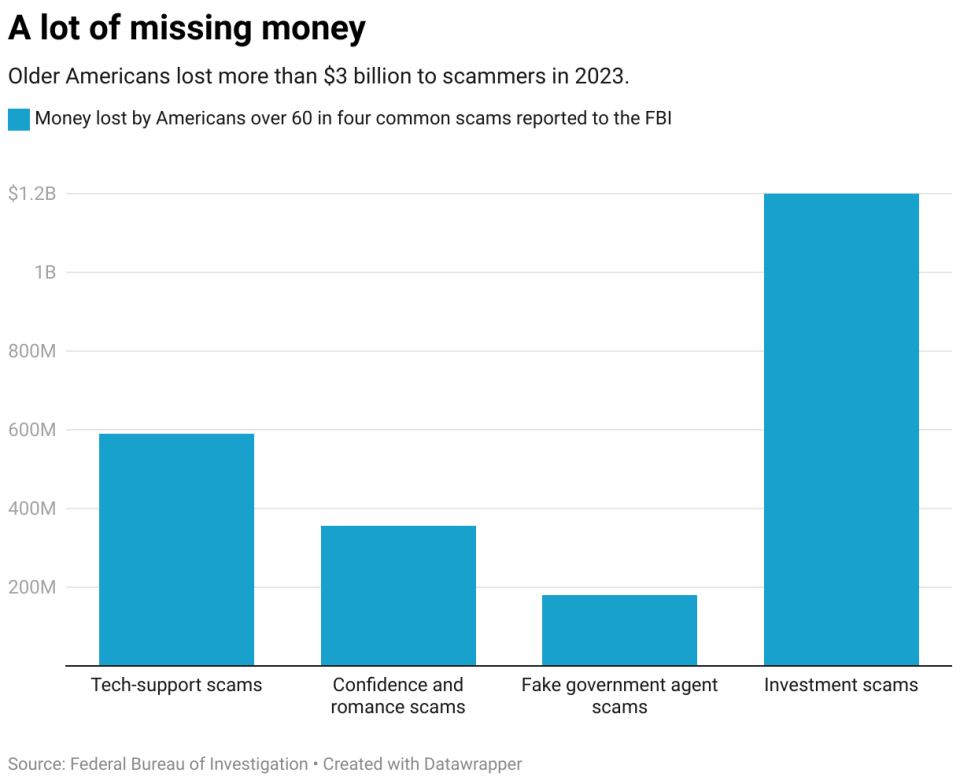Americans age 60 and older lost more than US$3 billion to scammers in 2023, according to the FBI.
To put that whopping figure in context, Taylor Swift’s Eras Tour recently made news as the first concert tour ever to earn $1 billion.
As a geriatrician – a doctor who cares for people over 65 years of age – I believe elder fraud has reached an epidemic scale. My patients often tell me about being scammed.
The consequences can be worse than just losing money. The experience is traumatic for many, with some victims feeling deep shame and self-doubt in the aftermath. This can interfere with their relationships, erode their trust in others and harm their mental and physical health.
Teaching older Americans how to identify and avoid fraud – and how to report such crimes – could go some way to mitigating the impact of this modern epidemic.
Elder fraud is on the rise
A recent FBI report shows just how prevalent elder fraud is. In 2023, Americans over 60 submitted 14% more complaints to the FBI’s Internet Crime Complaint Center, or IC3, than they did the previous year. Estimated financial losses rose about 11% over the same period.
These numbers, grim as they are, only represent the tip of the iceberg. For one thing, only about half of the reports of internet crimes to the FBI included information about the victim’s age – which means reported incidents of elder fraud are an undercount.
What’s more, these figures don’t include the many scams that take place over the phone, by mail or in person. And many fraud victims never report their experiences – often because they’re embarrassed, afraid or unsure what to do.
While people of all ages are victimized by fraudsters, older adults can be uniquely vulnerable.
The FBI has suggested that older adults are often targeted because they tend to be more trusting and polite. They often have financial savings, own homes and have good credit – all of which make them more attractive to scammers.
Older adults may also be less comfortable with new technologies, which puts them at risk. Consider that someone who is 85 years old may have retired in the year 2004 – three years before Apple introduced the iPhone. While many forms of technology have permeated our personal lives, it’s often in the workplace that many people receive mandatory training – like how to avoid online scams.
The wide world of frauds
In 2023, tech-support scams were the most commonly reported type of elder fraud. Other common schemes include romance scams, online shopping swindles and investment frauds. While tech scams are the most common, investment scams are the costliest, accounting for nearly half of all reported losses from those over 60 last year.

Fraudulent call centers are also well known for targeting older adults. Such scams made up 40% of reported elder fraud cases in 2023, according to the FBI, accounting for at least $770 million in losses. Many make use of new technologies such as artificial intelligence to deceive people more effectively with voice-cloning scams or “deepfake” videos.
Call-center scammers tell all sorts of tall tales. In 2022, more than 600 people reported being victimized in a single timeshare-related fraud. They collectively lost nearly $40 million. And in the latter half of 2023, scammers posing as government officials and tech-support agents pushed victims to liquidate their assets or buy precious metals – with reported losses reaching more than $55 million.
Combating an epidemic of scams
As with any epidemic, “infection control” tools can help us limit the spread. Much like vaccines create immunity against viruses, prevention efforts can help people build up their defenses to avoid fraud. The main tool for preventing fraud is learning how to identify likely scams ahead of time. Here are a few FBI-approved tips to help you do that:
• If you believe there is an imminent danger to yourself or a loved one, call the police immediately.
• Be cautious of unsolicited phone calls, mailings and door-to-door service offers.
• Don’t click on any unsolicited links you receive via email or text – even if they seem to be from people you know. And never open an email attachment from someone you don’t know.
• If you’re in doubt about a person or business, search online for their name, email, phone number and addresses, as well as details about their proposed offers. These days, most legitimate businesses have some degree of web presence. And if it’s a scam, you might find others have already shared information about it.
• Never give or send anything to unverified people or businesses. This includes any personally identifiable information, money, jewelry, gift cards, checks or wire information.
• Make sure your computer antivirus and security software and malware protections are up to date.
• Bad actors can use pop-ups to spread malicious software. If you see a pop-up message, disconnect from the internet and shut down your device. You can enable pop-up blockers to avoid accidentally clicking on one.
• Don’t give anyone you don’t know remote access to “fix your computer” or other electronic devices. This could let them see personal information, including details about your financial accounts.
• If you’re told to lie to your bank about why you need to wire money or make a withdrawal, it’s probably a scam. A legitimate business won’t insist you keep secrets from family or friends, either.
• Resist pressure to act quickly. This is a big one: Scammers often create a false sense of urgency. A legitimate business will let you think through your financial decisions.
• Perhaps most importantly, trust your instincts.
What to do if you think you’ve fallen for a scam
Despite your best efforts, you might still be taken in by a fraudster. If that happens, know that you’re not alone – and that it’s possible to recover. Here is some advice for dealing with the aftermath:
• If a criminal gains access to your device or account, take action to protect your identity. If a bank is involved, immediately contact your financial institutions to place protections on your accounts, and monitor your accounts and personal information for suspicious activity.
• Contact your local FBI field office, or, if the crime was committed over the internet, submit a tip online.
• When reporting a scam, include as many details as possible. This can include names, dates of contact, methods of communication, phone numbers, email and mailing addresses, and websites used by the perpetrator.
• Also note methods of payment, where you sent any funds – including wire transfers and prepaid cards – and account numbers. Offer descriptions of your interactions with the scammer and any instructions you were given.
• Whenever possible, you should keep original documents, emails, faxes and logs of communications.
• Falling for a scam can be frightening and stressful. Talk with people who you know and trust to support you through this challenging time. Some support groups include the AARP Fraud Watch Network and the Cybercrime Support Network’s Peer Support Program.
• If your emotional response is overwhelming, consider talking with a counselor, therapist or your medical team.
If you or someone you love falls into a fraud scam, you aren’t alone. Not even law enforcement experts are immune. At the age of 90, former FBI director William Webster was targeted – an experience he bravely shared with the world.
I encourage my patients not to feel too embarrassed to report what happened. Talking about these experiences is an important step toward fighting this epidemic.
This article is republished from The Conversation, a nonprofit, independent news organization bringing you facts and trustworthy analysis to help you make sense of our complex world. It was written by: Laurie Archbald-Pannone, University of Virginia
Read more:
Laurie Archbald-Pannone receives funding from Virginia Department of Health, West Health Institute, and Prime, Inc.











